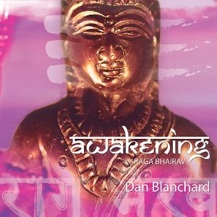Dan Blanchard’s
Awakening - Raga Bhairav (pronounced “buy-ruv”) was created as a musical accompaniment for early morning meditation and movement. Inspired by Indian classical music, Blanchard performs on santoor (a 100-string Indian instrument similar to the hammered dulcimer), tanpura, swarmandal, and harmonium and is joined on the various eight tracks by Sheela Bringi on bansuri flute, Brian Campbell on tabla, Gabe Marihugh on udu and djembe, Sangeet Mishra on sarangi, and Nisha Narsai on vocals. Raga is one of the primary forms of Indian classical music, and its name is Sanskrit for “that which colors or leaves an impression.” The raga form consists of “rules” that designate specific notes and embellishments, musical phrasing, emphasized notes, etc. Comprised of several movements that incorporate improvisation, a raga is different every time it is played. Ragas are often composed for a specific time of day, and this one is intended for early morning - particularly before dawn and the few hours that follow. It is structured to begin with quiet mediation or gentle warm-ups. As it evolves, rhythm is added and the tempo becomes livelier to encourage physical movement. It then slows down again to a more relaxed tempo. The album plays as an uninterrupted whole, but the eight tracks are easy to access individually, allowing the listener to change the playing order, if desired.
Awakening begins with “Invocation,” which contains the Mahamrityunjaya Mantra from the
Rig Veda, an ancient Indian scripture that is used to enhance health and vitality; Nisha Narsai’s beautiful vocals are hypnotic. “Centering (Alap)” is the actual beginning of the raga, and the melodic structure is slowly improvised without rhythm. This movement is very quiet and peaceful. “Emerging (Jod with Udu)” adds udu (a clay drum) to the hypnotic santoor, introducing rhythm to the melody. The tempo is still very calm, but energy is starting to build within the music. “Sustaining (Vilambit Gat in Rupak Taal)” has a 7-beat rhythmic cycle that continues at a slow tempo. It is accompanied by the tabla (an Indian percussion instrument similar to bongo drums). “Embracing (Madhya Gat in Teentaal)” picks up the tempo a bit, again accompanied by tabla. “Elation (Drut Gat in Teentall)” pulls out all the stops, increasing the tempo to a breathless pace. The climax (Jhala) would typically end the raga, but Blanchard continues with two more movements for gradually decelerating to a more relaxed tempo. “Transformation” slows dramatically, adding vocals, flute, and harmonium; Nisha Narsai’s singing is again magical and hypnotic. “Integration” is a “final relaxation” with vocal and flute, intended to integrate the musical journey and bring this compelling raga to a conclusion.
Awakening is music with a purpose, and Dan Blanchard is obviously a musician who has studied Indian classical music and instruments in great depth. If you are into this kind of music and/or meditation, this album would be an excellent choice. It is available from
www.peacefulvibes.com, Amazon, iTunes, and CD Baby. There are free bonus tracks and suggestions for morning time at
www.peacefulvibes.com/awakening.

